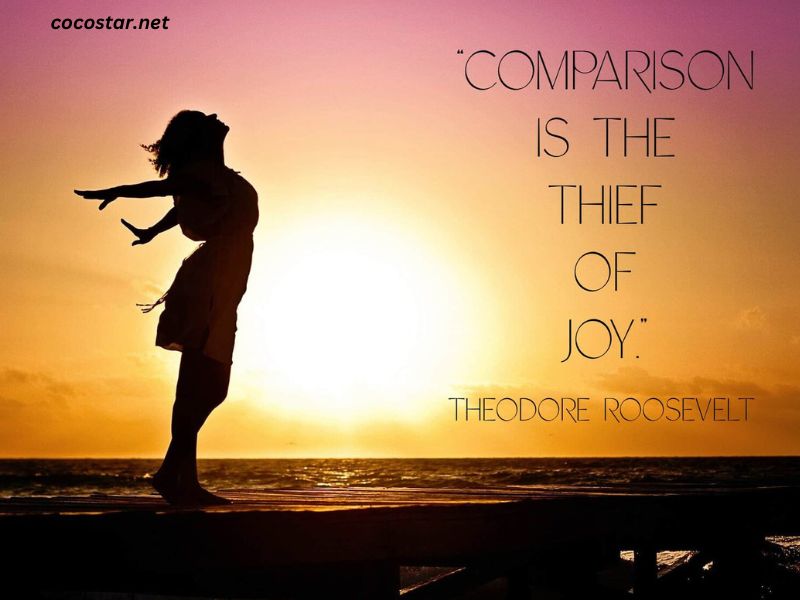In today’s world, where social media floods us with snapshots of other people’s seemingly perfect lives, the phrase “Comparison is the thief of joy” has never resonated more deeply. Attributed to Theodore Roosevelt, this adage encapsulates a universal truth about the negative effects of constantly measuring ourselves against others. But what does this concept really mean, and why does comparison lead to such dissatisfaction? In this article, we will explore the origins and implications of this phrase, delve into the psychological impacts of comparison, and offer insights into how we can overcome its destructive influence on our happiness.
The Origins of “Comparison Is the Thief of Joy”
The phrase “Comparison is the thief of joy” is most famously attributed to Theodore Roosevelt, the 26th President of the United States. Roosevelt, known for his adventurous spirit and pursuit of personal growth, likely recognized the dangers of comparing oneself to others as a means of measuring success and happiness. While the phrase has become more popular in modern times, its message is timeless and speaks to an age-old human tendency to gauge our worth by the standards set by those around us.
In the age of social media, this concept has gained even more relevance. Platforms like Instagram, Facebook, and TikTok showcase the best moments of people’s lives—perfect vacations, polished career achievements, and seemingly flawless appearances—creating a distorted sense of reality. For many, these carefully curated glimpses into other people’s lives trigger feelings of inadequacy and envy, which robs them of their own contentment and joy.
The Psychological Impact of Comparison
1. Lowered Self-Esteem
One of the most immediate effects of comparison is its ability to lower self-esteem. When we compare ourselves to others—whether it’s in terms of physical appearance, career success, or social status—we often come up short. This can lead to feelings of inferiority and self-doubt. Instead of appreciating our own unique qualities and accomplishments, we focus on the perceived shortcomings that seem to pale in comparison to others’ success.
Psychologists refer to this as “social comparison,” a theory developed by Leon Festinger in 1954. According to Festinger, people have an inherent drive to evaluate their own abilities and opinions by comparing themselves to others. While some level of comparison can motivate us to improve, chronic comparison can be detrimental to our mental well-being. The more we focus on others’ perceived advantages, the more likely we are to feel inadequate and less worthy.
2. Increased Anxiety and Stress
Constantly measuring ourselves against others can create a sense of competition that leads to heightened stress and anxiety. When we feel like we are “falling behind” or not living up to societal standards, the pressure to “catch up” can become overwhelming. This anxiety is further exacerbated in the digital age, where every moment is documented and shared in real-time. The fear of missing out (FOMO) becomes a constant companion, leaving us feeling as though we are always a step behind everyone else.
This anxiety isn’t limited to career or social success; it can also affect our personal lives. For instance, when we see our peers getting married, buying homes, or having children, we might feel as though we are not achieving these milestones fast enough. The resulting pressure to “keep up” can cause unnecessary stress and take away the joy that comes from living in the moment and appreciating the journey.
3. Depression and Negative Thinking
Comparison also has a strong link to depression. When we constantly compare ourselves to others, we may start to feel like we are not enough. This negative self-talk can spiral into deeper feelings of sadness and hopelessness. The more we focus on what we lack in comparison to others, the more we become consumed by negative thinking patterns that erode our self-worth and happiness.
People often look at others’ successes and assume that they are without flaw. However, this assumption ignores the fact that everyone has struggles and challenges. Comparing our behind-the-scenes reality to someone else’s highlight reel distorts our perception of the world and can contribute to feelings of isolation and loneliness.
The Social Media Effect
In the age of social media, comparison has reached unprecedented levels. Platforms like Instagram, Facebook, and TikTok offer a constant stream of content that invites users to compare their lives with those of others. Whether it’s the image of a friend’s luxurious vacation, a celebrity’s glamorous lifestyle, or a colleague’s career achievements, social media is filled with curated glimpses of success and perfection.
While social media can be a powerful tool for connection, it often fuels comparison and feelings of inadequacy. Research has shown that the more time people spend on social media, the more likely they are to experience negative emotions related to comparison. This is because social media feeds are carefully edited and filtered, showing only the best aspects of people’s lives. The reality, however, is often quite different. The pressure to present a perfect image online can lead to feelings of insecurity, envy, and diminished self-worth.
The concept of “highlight reels” versus “behind-the-scenes” moments is central to understanding the impact of social media. When we compare our everyday struggles with others’ polished posts, we are inevitably setting ourselves up for disappointment. It is important to recognize that no one is immune to challenges, regardless of how perfect their social media presence may seem.
Why Comparison Doesn’t Lead to Happiness
1. It Undermines Gratitude
When we focus on what others have that we don’t, we lose sight of the blessings in our own lives. Gratitude is a powerful tool for cultivating joy, and it can only thrive when we appreciate what we have, rather than what we lack. Comparison shifts our attention away from the positive aspects of our own lives, making it difficult to feel truly content with who we are and what we have accomplished.
Gratitude helps us to feel more satisfied and fulfilled, and it has been linked to improved mental health and well-being. By focusing on the good things in our lives and appreciating them fully, we can counteract the negative effects of comparison.
2. It Encourages Unrealistic Standards
Comparison often leads us to set unrealistic standards for ourselves. We begin to believe that in order to be successful or happy, we must measure up to a specific ideal that is often based on superficial or unattainable criteria. Whether it’s striving for an unrealistic body type, a dream job, or a perfect relationship, comparison encourages us to chase after goals that may not even align with our true desires or values.
This pursuit of perfection is not only exhausting but also ultimately unfulfilling. Happiness comes not from achieving someone else’s idea of success but from defining success on our own terms. When we stop comparing ourselves to others and focus on our own path, we free ourselves from the pressure of living up to external expectations.
3. It Prevents Personal Growth
When we are fixated on how others are doing, we lose focus on our own growth. Comparison keeps us stuck in a cycle of self-judgment and stagnation. Rather than using others’ successes as inspiration to improve, we may find ourselves paralyzed by feelings of inadequacy or jealousy. Personal growth requires introspection, effort, and the ability to embrace our unique journey, without constantly measuring it against someone else’s.
Overcoming the Dangers of Comparison
1. Practice Self-Compassion
One of the most effective ways to combat the negative effects of comparison is by practicing self-compassion. This involves treating ourselves with the same kindness, understanding, and support that we would offer to a close friend. Instead of being harsh on ourselves when we fall short, we can acknowledge our imperfections and embrace them as part of our personal growth. By being gentle with ourselves, we can break free from the cycle of comparison and cultivate a sense of inner peace.
2. Limit Social Media Use
Given the pervasive influence of social media on comparison, one practical step toward reclaiming joy is limiting our time spent on these platforms. Setting boundaries around social media usage allows us to reduce exposure to comparison triggers and gives us more space to focus on our own lives. Consider taking regular breaks from social media or curating your feed to include only content that uplifts and inspires you.
3. Focus on Your Own Journey
Instead of comparing your progress to others, focus on your own journey and personal growth. Set goals that are meaningful to you and celebrate the small victories along the way. Remember that success is not a race, and your timeline is unique to you. Embrace the beauty of your own path, and trust that it will lead you exactly where you need to be.
Conclusion
“Comparison is the thief of joy” is a powerful reminder of how easily we can be robbed of our happiness when we focus too much on what others have or achieve. The act of comparing ourselves to others breeds dissatisfaction, stress, and insecurity. To reclaim our joy, we must cultivate gratitude, practice self-compassion, and embrace our own journey without constantly measuring it against the lives of others. By doing so, we can find true happiness in the present moment, free from the shackles of comparison.



